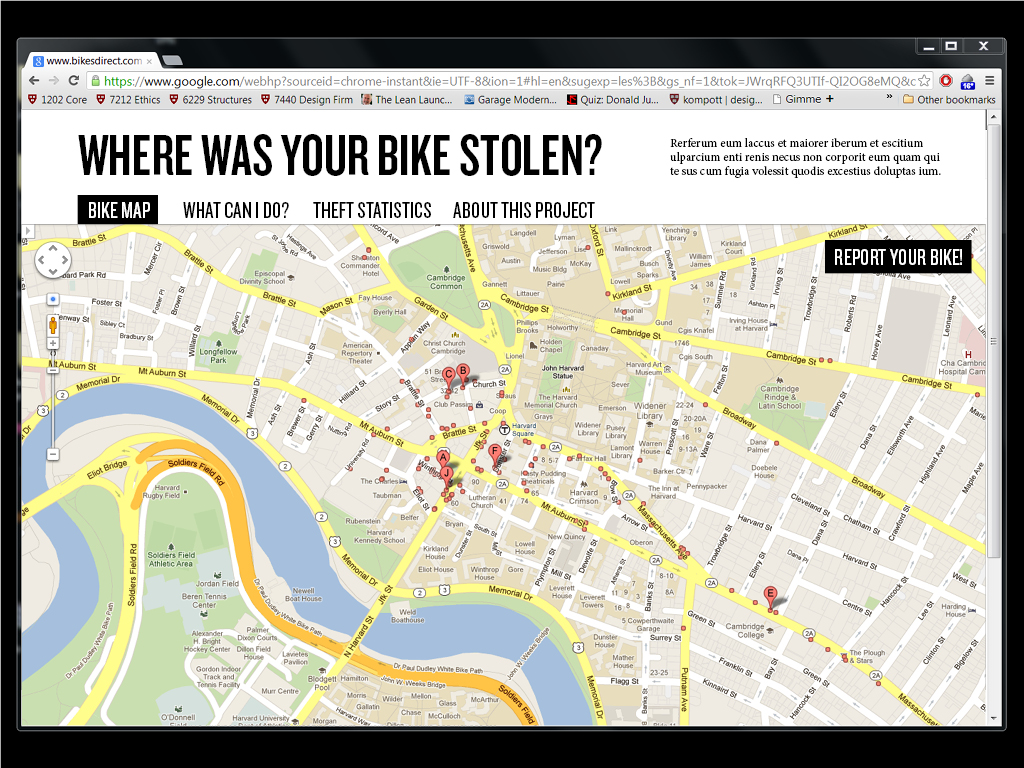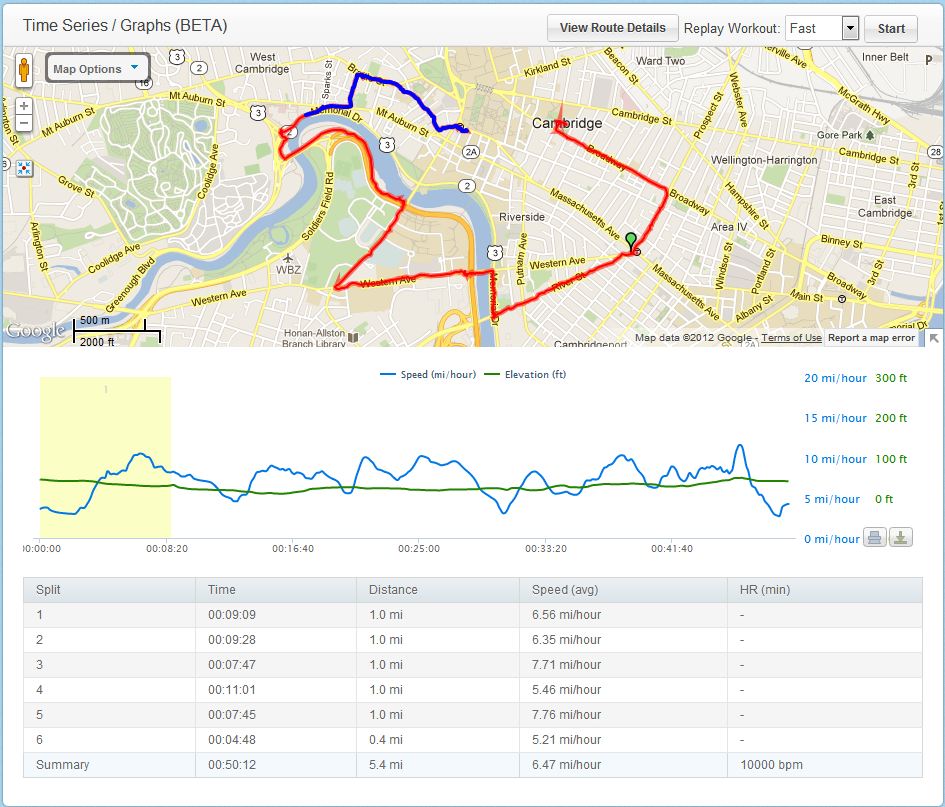Networked Urbanism
design thinking initiatives for a better urban life
apps awareness bahrain bike climate culture Death design digital donations economy education energy extreme Extreme climate funerals georeference GSD Harvard interaction Krystelle mapping market middle east mobility Network networkedurbanism nurra nurraempathy placemaking Public public space resources Responsivedesign social social market Space time time management ucjc visitor void waste water Ziyi
Posts by Li, Lulu Zhizuo
Bikenapped is an online platform aimed at raising awareness and mapping bike thefts in Boston. For the public, Bikenapped serves as a place to get a clearer picture of the bike theft problem as well as a community to share your experiences with others. By offering a way for theft victims to reach out to each other, we can learn from our collective experience and band together to help find solutions. The data and narratives that the public provides are valuable as insight to help understand theft patterns and behaviors, as well as the immaterial value of cycling in our city. With better information we can help pursue policy change that can target the problem.
As Boston works towards becoming a world class bicycling city, promotion of cycling and cycling infrastructure has resulted in significantly rising ridership. However, this increase in cycling correlates with another phenomenon: the dramatic increase in bicycle thefts.
Bike theft is notoriously difficult to investigate, and stolen bicycles are equally difficult to recover. Theft victims often feel violated and helpless in the face of these crimes. There is nowhere for to speak out, no outlet for to take action. By gathering this community of individual voices, we can speak with a collective voice to shed light on the problem, and work together to find solutions.
MAPPING THEFT
One of the issues regarding bike theft lies in the shortage of data on these crimes. According to the reports from the Department of Justice, for every bike theft that is reported to the police, 4 or more thefts may have occurred. This severe underreporting prohibits us from seeing the full scope of the problem and from allocating adequate resources to tackle it. Bikenapped asks the community to participate in a user-generated mapping of theft incidents, to share information with our neighbors and our city.
TAKING ACTION
Raising awareness and disseminating information is crucial in addressing bike thefts. We seek to take the data beyond the digital realm and into the real urban environment we live in. Bikenapped asks users to post notice at the physical place of the theft to warn others of what had happened. The information is not just relevant on the internet, it is more relevant to all the people who use the spaces where these thefts happen.
CONNECTING VOICES
Change happens when we empower everyone to act. While bike theft is something most people experience alone, Bikenapped seeks to connect us with our neighbors and community. If we discover other people had their bikes stolen from the same place as ours, perhaps we can join together to demand for better safety measures in our neighborhood. If law enforcement is aware of certain zones of bike thefts, perhaps they are better equipped to police the area. If we know bikes have been stolen from a particular place, perhaps we will all be more vigilant to keep our neighborhoods safe from bike theft.
PROCESS AND THOUGHTS
The project began through data collection. Through visiting police departments and combing through public log information, we can already begin to see the difficulty in just understanding the bike theft issue in Cambridge. In just the city of Cambridge, there are three separate police departments that holds jurisdiction over different areas: the Cambridge Police Department, the Harvard University Police Department, and the MIT Police Department. In addition the MBTA Transit Police oversees all transit stops. All of these police departments have separate reporting and record keeping methods, which are not collated into a single database, but rather organized internally. From any one source, we can only see a narrow segment of the larger problem. It became clear that in order to understand the issue, we needed a place where information can be collated and made accessible to the public.
Bikenapped became a platform to not merely disseminate information, but also encourage participation. Bike thefts suffer from severe underreporting due to the common perception that nothing will come from a police report. Though the rates of recovery are surely low – and Bikenapped makes no claims at increasing the chances of recovery – a report on Bikenapped is something theft victims and see. It is visible on the map, and visible to every person who comes to visit it. A piece of information or an experience where a victim had once suffered alone, is now directly and visibly a contribution to a larger story and effort.
The reaction to Bikenapped has been extremely positive. As different media outlets and cycling blogs began to pick up the story, reports and emails started coming in. We had over 2500 unique visitors within the first 12 days, many from beyond the borders of Boston/Cambridge, all the way from Portland and California. The issue surely struck a cord to people, and the support and response that Bikenapped received validated the need for its existence.
Bikenapped aims to raise awareness for bike thefts and empower cyclists to take action.
As Boston works towards becoming a world class bicycling city, promotion of cycling and cycling infrastructure has resulted in significantly rising ridership. However, this increase in cycling correlates with another phenomenon: the dramatic increase in bicycle thefts.
Bike theft is notoriously difficult to investigate, and stolen bicycles are equally difficult to recover. Theft victims often feel violated and helpless in the face of these crimes. There is nowhere for to speak out, no outlet for to take action. By gathering this community of individual voices, we can speak with a collective voice to shed light on the problem, and work together to find solutions.
MAPPING THEFT
One of the issues regarding bike theft lies in the shortage of data on these crimes. According to the reports from the Department of Justice, for every bike theft that is reported to the police, 4 or more thefts may have occurred. This severe underreporting prohibits us from seeing the full scope of the problem and from allocating adequate resources to tackle it. Bikenapped asks the community to participate in a user-generated mapping of theft incidents, to share information with our neighbors and our city.
TAKING ACTION
Raising awareness and disseminating information is crucial in addressing bike thefts. We seek to take the data beyond the digital realm and into the real urban environment we live in. Bikenapped asks users to post notice at the physical place of the theft to warn others of what had happened. The information is not just relevant on the internet, it is more relevant to all the people who use the spaces where these thefts happen.
CONNECTING VOICES
Change happens when we empower everyone to act. While bike theft is something most people experience alone, Bikenapped seeks to connect us with our neighbors and community. If we discover other people had their bikes stolen from the same place as ours, perhaps we can join together to demand for better safety measures in our neighborhood. If law enforcement is aware of certain zones of bike thefts, perhaps they are better equipped to police the area. If we know bikes have been stolen from a particular place, perhaps we will all be more vigilant to keep our neighborhoods safe from bike theft.
This week, I have been working on coding the bike theft map website. It is slowly coming into being. The basic layout and map functionality is completed, and the reporting mechanisms are minimally functional. I hope to complete this part of the project by this week.
In addition, I am scheduling interviews with bike theft victims to better understand the circumstances and explore other aspects of the crime that I have not yet explored. Particularly, I suspect there is a very personal narrative that exists with these events, and want to begin to collect those stories.
In the meantime, I am wondering how to reach out to bike theft victims to get the word out about the mapping tool, as well as collecting interviews. Do you know of anyone who has had their bike stolen? If so, please get in touch!
Think Big
As Boston continues on its mission to make the city into “a world-class bicycling city by creating safe and inviting conditions for all residents and visitors,” ridership and interest in cycling have all been on the rise. With new bike lanes, a new bike share program, and new cycling events coming to the city, we see a concerted effort to promote bicycling in Boston. However, with the rise cycling, we also see a rising trend in bike thefts as well. While ridership from 2007-2009 increased by 122%, bike thefts in Cambridge alone has gone up 54% from 2009-2010.
The issue of bike thefts is already a persistent problem in cities with robust biking culture such as London, where over 20,000 bikes were reported stolen in 2010 alone. Not only are the crimes detrimental to cycling culture in a direct way, but they also produce a type of psychological trauma. Studies have shown that 1 in 4 people who have had their bicycles stolen, never ride again.
Bike thefts as a phenomenon is complex and must be studied from all aspects, examining the different roles that factor into the narrative. From the bike owner’s perspective, we look at issues of bike security practices and theft deterrence and awareness. From the thief perspective, we must understand the risks they take and how they operate. Bike theft as crime is low priority for most police forces. Even when apprehended persecution is minimum, making bike theft a low risk/high reward crime. Finally, the aftermarket for stolen bikes should be examined. Prospective used-bike buyers create the market for stolen bikes. How are used/stolen bikes sold, and how can buyers be a part of the effort to reduce theft?
Start Small
The first stage of the project calls for data collection and research. I am in the process of building a website that will allow users to geotag where their bikes were stolen. We can begin to get a “heat-map” of high(er) theft areas, and begin to analyze their commonalities. Data will be user submitted. The website will both function as a research tool, and also as information for the general public and part of a possible recovery effort.
Act Now
Interviews with the Harvard Police Department will be conducted on understanding the criminal charges and the punishment for bike thieves, how the police combats this rising problem, current initiatives, as well as a request for crime statistics and possible police reports.
MIT automatic real-time mapping project is really blowing my mind right now.
The following data was logged during the studio bike ride on Tuesday with the iphone app, MapMyRun. The data is more interesting than I originally thought since the pace was measured in realtime, and not as an average at the end. You can see the variable pace graphed along with the elevational data, which gives us a better understanding of the route. Rather than the trip takes us 50 min to complete, we know where we were the slowest, and can better identify the conditions that effect bike traffic (ie: road conditions, car traffic, multiple crosswalks etc.)
Li, Lulu Zhizuo
It appears that Li, Lulu Zhizuo hasn't tweeted anything yet.


